RANGOON — The latest round of peace negotiations between the Burmese government and the country’s ethnic armed groups wrapped up in Rangoon on Friday, with little concrete progress toward a long-awaited nationwide ceasefire agreement (NCA).
Talks will resume in early August in efforts to resolve three remaining issues with a current draft of the accord, which has been in the making for more than 18 months and aims to end decades of civil conflict in the country between ethnic rebels and the Burma Army.
The peace process was stunted earlier this year as conflict continued in the country’s northeast, and was stirred again early last month when the ethnic negotiating bloc—the Nationwide Ceasefire Negotiation Team—was replaced by a new Senior Delegation.
The new team requested 13 amendments to a draft tentatively agreed upon by both sides earlier this year, three of which remain unresolved. Among the contentious issues are disarmament, demobilization and reintegration (DDR), natural resource management and whether the president and legislature can be signatory to the pact.
A further stumbling block has been the exclusion of several ethnic armed groups that are not recognized by the government and therefore ineligible to sign the accord. The three groups—the Ta’ang National Liberation Army (TNLA), Arakan Army (AA) and the Myanmar National Democratic Alliance Army (MNDAA)—have all been involved in the devastating Kokang conflict that began in February.
The TNLA, which is a member of the NCCT but does not have a bilateral ceasefire with the government, attended this week’s talks to show its commitment to reaching a genuine nationwide accord. A senior official from the group said, however, that the government was reluctant to include them in discussions before reaching a bilateral accord.
“We are being pressured to sign a bilateral ceasefire agreement with the government,” said TNLA deputy information officer Tar Bang Hla. “We could do it, but they wouldn’t talk to us.”
Regarding the three armed groups that are ineligible to join the NCA, Hla Maung Shwe of the technical support group Myanmar Peace Center (MPC) said the signing of bilateral ceasefires is necessary for inclusion in the nationwide accord because it demonstrates a “deep commitment” to peace.
“The other groups [TNLA, AA and MNDAA] do not have bilateral agreements on anything yet,” Hla Maung Shwe told The Irrawaddy. “We want them to have a deep commitment through a bilateral agreement… this is why we want to sign the NCA first with armed groups who already abide by a bilateral agreement. It took a long time to draft the NCA, and we want them [ethnic armed groups] to be deeply committed before signing it.”
The government’s negotiating team, the Union Peace-making Work Committee (UPWC) will continue to work with the Senior Delegation to find a way to reach agreements with the three outsiders, he added, explaining that there have been “many reasons for many difficulties” while negotiating with them.
Those ethnic armed groups that are eligible for the pact have reiterated their wish to include all stakeholders. Kweh Htoo Win, general secretary of the Karen National Union, said the position of the Senior Delegation was clear on inclusion.
“We all hold our policy and negotiate with each other. From our side, we will sign the NCA when all of our 16 members can participate,” Kweh Htoo Win said. “We need to find a method to negotiate [with groups that do not have bilateral ceasefires] and reach an agreement.”

















